mv 103107
By Jim Benedetto For Variety
I AM writing to give my perspective on H.B. 15-38, the Alien Workers Act. I have worked with members of the JGO Committee in the House for many months, to provide insight on how the legislation will affect the commonwealth’s guest workers. Chairwoman Cinta Kaipat has been most gracious in allowing me to offer my thoughts and suggestions, and I want to publicly thank her for all of her hard work and patience. The version of the bill that has now passed both houses of the Legislature bears little resemblance to the one that was introduced almost two years ago. There were many problems with the original bill, and to her credit, Chairwoman Kaipat took the time to receive comments and suggestions from various people in and out of government in crafting this version. As a result of her considerable effort, there are many provisions in the Act that would be major improvements over the current law. For example:• Section 4802 would require that documents coming from overseas, such as health and police clearances, will only be accepted if they come from agencies on a list approved by the Department of Labor, in order to cut down on the many fraudulent documents submitted in support of alien worker contracts. • Section 4924 would replace the current labor bonds with “approved security contracts” that would be easier to tap in the event the employer is unable to pay for a worker’s wages, medical bills or repatriation ticket. • Section 4932 would allow employers to participate in “pool insurance” with CHC to cover their guest workers’ health care needs at an affordable cost. • Section 4934 would require all workers entering the commonwealth and their employers to attend a mandatory orientation session at the Department of Labor, so that workers can learn about their rights under the law and where to go for assistance if they have a problem. • Section 4939 would establish a comprehensive and practical system for worksite inspections by the Department of Labor, to ensure that worksites and safe and legal.Unfortunately, the bill is marred by provisions that will narrow a worker’s right to file a complaint, and make it impossible for many to obtain any relief whatsoever under the Act. Fortunately, all of these provisions can be amended or removed from the bill, which will result in stronger, more effective legislation. The sections of the bill that concern me greatly are listed below, along with an explanation of why they will prove to be troublesome. Restrictions on who can file labor complaintsSection 4941 of the bill only allows “foreign national workers” to file labor complaints, and then only to enforce “approved employment contracts.” Section 2 of the bill states, “It is the intent of the Legislature that this Act shall not apply to persons admitted to the Commonwealth as tourists, or to persons employed illegally, i.e. without the approval of the Department of Labor.... It is the intent of the Legislature that persons...illegally employed be prohibited from using the terms of this Act to receive or avail themselves of a legal right or benefit.” This means anyone who either doesn’t have a contract, or whose contract hasn’t been approved yet, or has expired and awaiting renewal, is not covered by the Act.This creates an injustice because many workers are technically out-of-status when they file their complaints, through no fault of their own. For example, an employer will tell a worker that his renewal papers have been submitted, when the employer has not done so. By the time the worker checks at Labor or comes to the ombudsman’s office for help, he may have been working illegally for months. Other employers file the worker’s application, but purposely leave out some required paperwork, such as the health clearance, knowing that Labor will reject the contract because of a “deficiency,” and issue a denial. Since most workers don’t have post office boxes, Labor sends the denial to the employer, who may never tell the worker. Once the worker learns he’s been tricked, it is too late; he has already been working illegally. I think the workers in these two examples should be allowed to file a complaint to collect their wages. If this provision becomes law, workers in these situations will, through no fault of their own, be without any recourse to justice. Prior to 2004, the Department of Labor used to refuse to accept complaints from workers if they were out of status, or if their complaint was not in the proper form. This resulted in many people being turned away from Labor, and abusive employers were neither reported nor sanctioned for their violations. This was remedied in 2004, through revised Alien Labor Rules & Regulations. The revised rules made sure that no one got turned away from actually filing the complaint, no matter what their legal status or the form of their complaint. The department reasoned that it would be better for the hearing office to screen out invalid complaints, after getting all of the facts, rather than refuse the complaint automatically. This is still good policy today, and should be retained. Workers who file legitimate complaints actually assist the department by reporting illegal activity by employers. If the Act excludes whole classes of workers from filing complaints, abusive employers will be able to evade the law, because Labor will never find out what they are doing. Letting crooked businesses get away with breaking the law hurts legitimate businesses; it costs money to comply with the law, money that dishonest employers don’t pay. Employers who follow the labor laws are thus put at a competitive disadvantage. This is an unintended result that the Legislature should not endorse.Although some workers may file complaints just to stay in the CNMI, the vast majority file because they haven’t been paid, or because their employer treats them badly. We ought to encourage them to come forward when they think they are being cheated, so that Labor can make a determination whether their claims are legitimate and weed out bad employers for the benefit of all employers and employees in the commonwealth. An unnecessarily brief statute of limitationsSection 4962 sets a six-month statute of limitations for filing a labor complaint, in most cases. That means that a worker would not be able to complain about anything that happened more than six months ago. This is a problem because many employers repeatedly promise to pay the worker “next week,” and the worker is afraid if she complains, she will lose her job. So, if an employer strings a worker along for more than six months after the bill becomes law, the worker is just out of luck, and cannot file a complaint. Section 4962 has another little surprise: it would not allow any worker to file a labor complaint more than 30 days after the end of the worker’s contract. So, if the employer doesn’t pay the worker his last two weeks’ wages, the worker would only have 30 days, not six months, to complain. No other statute of limitations under commonwealth law is limited to such a short period of time. For example, commonwealth citizens have six years — not six months — to file actions to enforce a contract (7 CMC §2505). If resident workers can wait six years before losing their right to complain about a breach of contract, why should alien workers only get 180 — or 30 — days? There is no legitimate justification for such disparate treatment.The departure and return provisionSection 4956 provides that a worker who has filed a labor complaint must leave within 30 days, and can come back five days before the hearing (at his own expense, of course). Make no mistake; few, if any, nonresident workers will be able to afford to return to the commonwealth for their hearing, especially if their complaint is for lost wages. Requiring the worker to depart will ultimately mean no recovery for nonresident workers who are cheated by their employers. Can it really be the intent of the bill to make it easier for employers to cheat foreign workers?The section also says that a hearing officer “may” allow the worker to stay beyond the 30 days, but using “may” instead of “shall” means it will be up to the discretion of a hearing officer whether the worker can stay or not. However, the CNMI Supreme Court has already struck down a similar section in two well-reasoned decisions. In Commonwealth v. Deala, 3 N.M.I. 110 (1992), the Supreme Court said that “[i]n an administrative proceeding where a person’s life, liberty, or property is at stake, Article I, § 5 of the Commonwealth Constitution requires, at a minimum, that the person be accorded a meaningful notice and a meaningful opportunity to a hearing, appropriate to the nature of the case.” In Commonwealth v. Rivera, 3 N.M.I. 436 (1993), the Supreme Court held that “an order of deportation, while a valid wage claim is pending, must be stayed until, at the very least, the worker is provided a meaningful opportunity to a hearing. To do otherwise would violate the due process provision of our Constitution.” In elaborating on what a “meaningful opportunity to a hearing” is, the court said:The property at stake for the workers in this case is each of their claims for unpaid wages. They must be allowed to have their wage claim heard. The opportunity to have their wage claim heard must be meaningful. In this particular case, it is not a meaningful opportunity to have a wage claim heard if it only means that a worker has to leave the island immediately and then return for brief visits, not to exceed a total of 90 days to pursue his or her claim. Due process cannot be satisfied in this case by placing a specified time limit on the opportunity for a hearing.Section 4956 will not pass the Deala and Rivera test because it sets a time limit on a worker’s stay to pursue his claims, and it leaves extensions up to the discretion of the hearing officer, both things the CNMI Supreme Court has said violate the Constitution. Restrictions on the type of violations that would justify transfer reliefSection 4947 of the bill would only allow the hearing officer to give a transfer to a worker “if other remedies are insufficient” to give the worker the benefit of the bargain he made with his contract. Even if other remedies are insufficient, a transfer can only be granted if the worker has been unlawfully terminated; if the department voids the worker’s contract with the employer; if the worker was laid off because of a reduction in force; or if the employer abandons the worker, but not if he abandons him during the last three months of the contract. The hearing officer can also give the worker a transfer if the employer doesn’t pay him, but only if the employer has violated the statute and the contract twice, or if the hearing officer finds that the worker has proved a violation “under an alternate theory of law and that transfer relief is appropriate.” But wait; section 4947 goes on to say, “A transfer may be granted only to a foreign national worker who has complied with the provisions of the approved employment contract to the extent practicable under the circumstances, and for whom transfer relief is required in order to assure receipt of the benefit of the bargain under the contract.” This means that even if a worker proves his employer abandoned him or fired him illegally, or didn’t pay him twice, he will be denied a transfer if he didn’t follow every part of the contract, even if his employer didn’t complain about it, and even if it didn’t have anything to do with the employer’s violation. It also means that a worker will be denied a transfer if he can get the benefit of his contract without a transfer; in other words, we will be telling the worker, “here are your back wages, now you must leave.” As a result, workers will be less likely to come forward to complain about violations. So this will reduce the number of complaints that workers file, not because there are fewer violations, but because the law gives him a choice: stay with your abusive employer, or go back where you came from.Traps for workers who complainSection 4964 states that if a worker violates “any subsection of section 4963,” he can be deported and all his claims for money damages and other relief are forfeited. Section 4963 has a long list of violations, including some very common ones, any one of which could subject the worker to deportation and loss of all his claims, such as:• working before the contract has been approved, or after it has expired, even if under renewal; • working for a secondary employer, even incidentally; • engaging in any business activity other than for one’s employer; • giving any “misleading” information to any Department of Labor or executive branch personnel, orally or in writing, at any time; • and being a minor. Now, I do not condone anyone breaking the law, but those who do so must have a punishment that fits their crime. It is grossly unfair to tell a worker who has worked past his contract because his employer told him it was okay, “sorry, you are deported and cannot collect any back wages.” And the most common violation by workers — payment of their own application or renewal fees — subjects them to deportation under section 4964(d). It is common knowledge that many, many workers, especially housekeepers, pay those fees because the employer requires it of them. The Act would whipsaw these workers; first, their employer illegally makes them pay their application fees, then the department deports them for doing so.Restricted judicial reviewOne more brief point: section 4949 of the bill would restrict judicial review to the record below. In other words, uneducated foreign workers, most without lawyers, will have to think of every possible legal argument and bring every piece of evidence when they have their hearing at Labor, because the bill will not allow the Superior Court to consider any evidence the worker did not know to raise in the administrative hearing. So much for alien workers getting a fair shake in the courts!* * *Any one of the above provisions, taken individually, raises legal and moral questions we should try to answer before this Act is signed into law: What would this provision actually accomplish? Is it constitutional? Will it cost the commonwealth a lot of money and wasted time because of lawsuits? Is it a step forward in protecting workers, or a way of reducing complaints by punishing those who dare to complain? How will others — in the news media, and in Washington, D.C. — perceive and react to this provision?Taken collectively, the provisions described above will have a tremendous “chilling effect” on a worker’s right to complain. They will make the filing of a complaint not only an exercise in futility, but also a minefield where any past misstep will result in total denial of wage claims and speedy deportation. Taken together, these provisions will be perceived as mean-spirited and punitive, and will only reinforce the reputation of the CNMI as a place where workers are subject to rampant abuse. I do not believe the members of the 15th Commonwealth Legislature want that to be their legacy in passing the Alien Workers Act. I do not believe it is their intent to punish workers for complaining, or to make it more difficult for them to get a fair shake from employers, or from the Department of Labor. Amendment of these provisions will take nothing away from this legislation; let’s take the time to ensure the Alien Workers Act is fair and workable. I would be glad to assist the Legislature in this process in any way the members think may be helpful.
.
.
TAOTAO TANO HAD SPOKEN
- A direct impediment to the human right to self-determination
- 12808 st - Taotao Tano rebuts Pete A. in interview with KSPN 2 News
- TAOTAO TANO CNMI sents letters to the community
- 011608 st - SEND THEM HOME
- 011608 mv - Guest worker faces deportation
- 011608 mv - TAOTAO TANO SLAMS FEDERAL LABOR OMBUDSMAN
- 121407 mv - Trampled by foreigners
- 121407 mv - The despair of the indigenous people
- 121407 st - Familiarity breeds contempt
- 121407 st - 'Be selective on who to bring in'
- 121407 st - This land belongs to the indigenous
- 121407 st - To the people of Precinct 1
- 121407 mv - Think again
UPDATES by links
- 020808 mv - Fitial ready to testify in DC vs federalization, wage hike
- 020108 mv - US Senate panel OKs federalization bill
- HOUSE APPROVED 3079
- 121407 mv -Fitial says feds applying ‘socialism’ to NMI
- 120707 mv - Bingaman answers Fitial
- 120307 mv - US House may vote on NMI federalization
- 110607 mv - Cohen: Fitial administration ‘misinterpreted’ nonimmigrant provision
- 110207 mv -Guest workers brace for final version of federalization bill
- 110207 mv -Gov’t to recalculate numbers of migrants before year ends
Tuesday, October 30, 2007
An open letter to the lawmakers and the people of the NMI
at
6:08:00 AM
Posted by
TAOTAO TANO CNMI
![]()
Subscribe to:
Post Comments (Atom)
OUR FALLEN HEROES
SAME THING WILL HAPPEN HERE - JUST CHANGE THE NUMBERS
JUST CHANGE THE NUMBERS TO CNMI NUMBERS AND
THE COHEN PLAN WILL HARM THE CNMI IN THE SAME WAY
CURRENT IMMIGRATION POLICIES WILL DAMAGE THE USA.

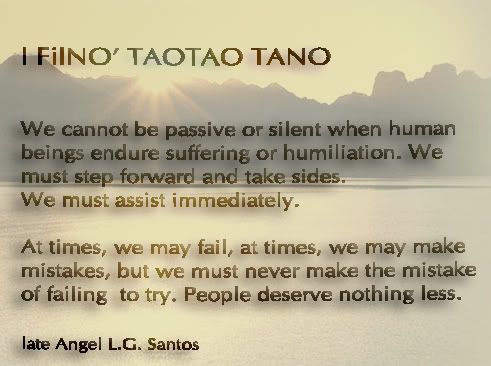


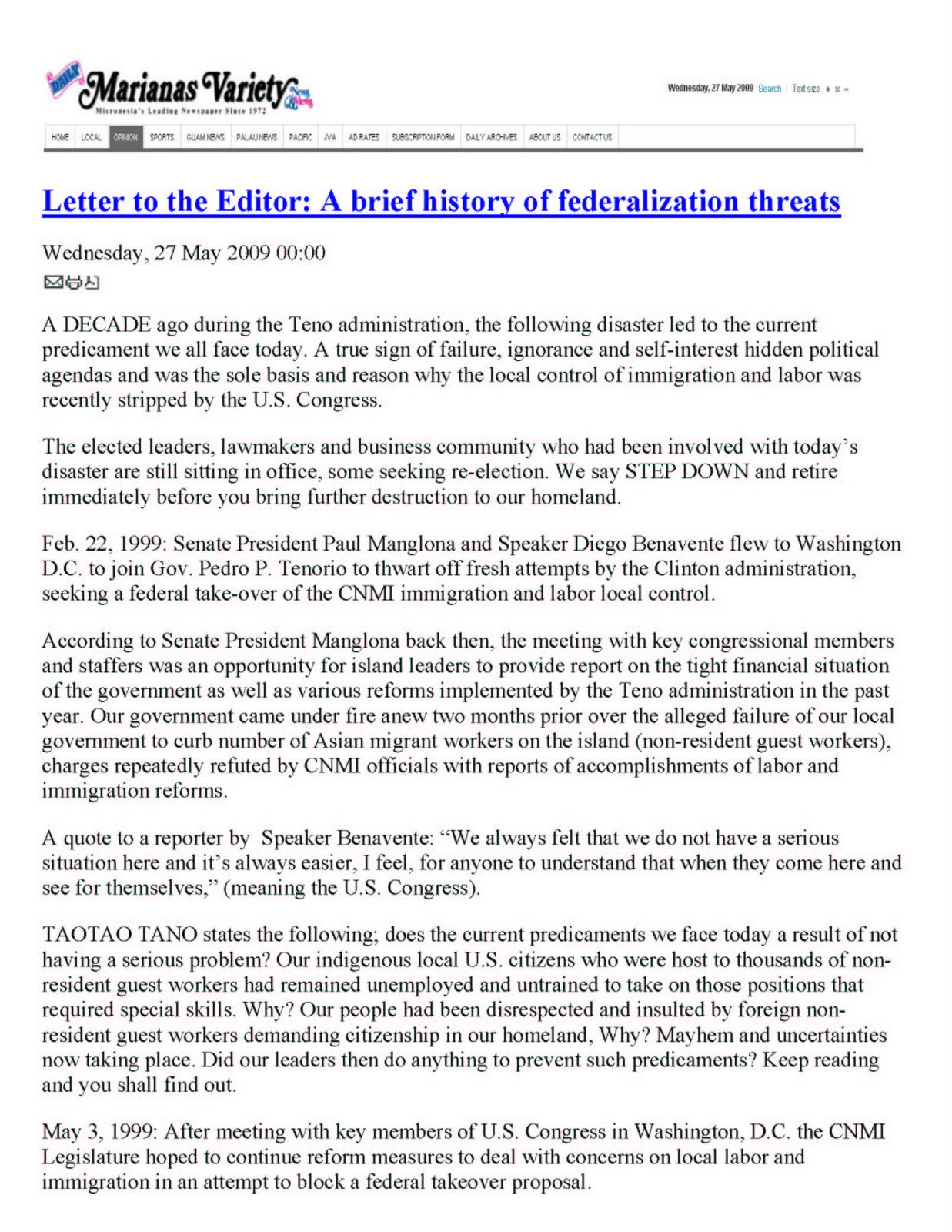

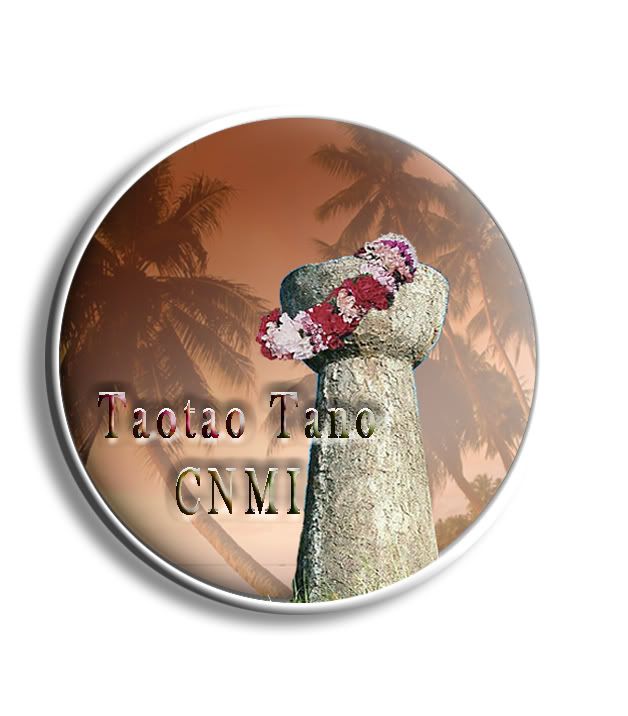


















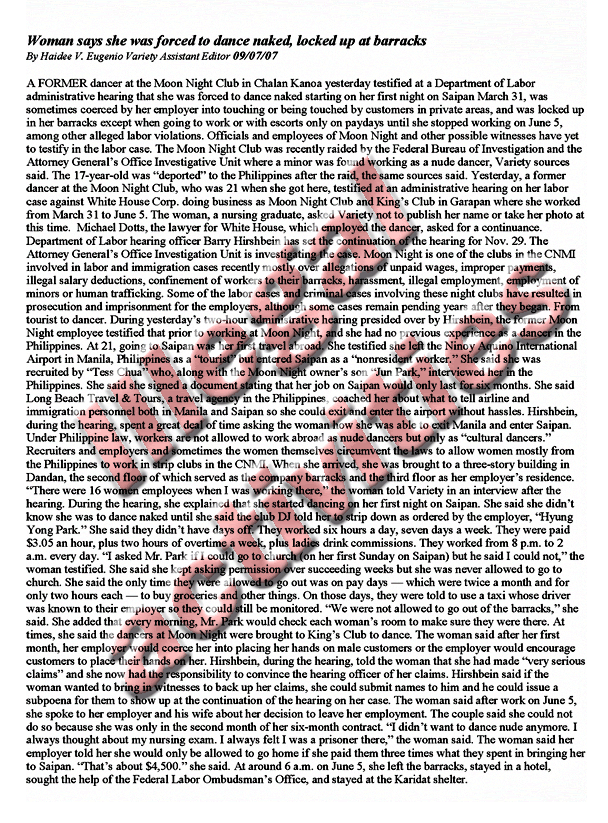
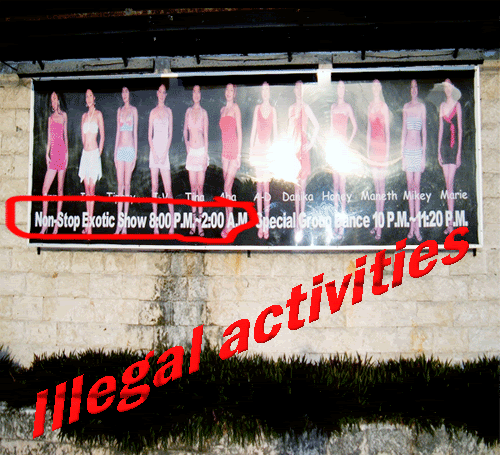


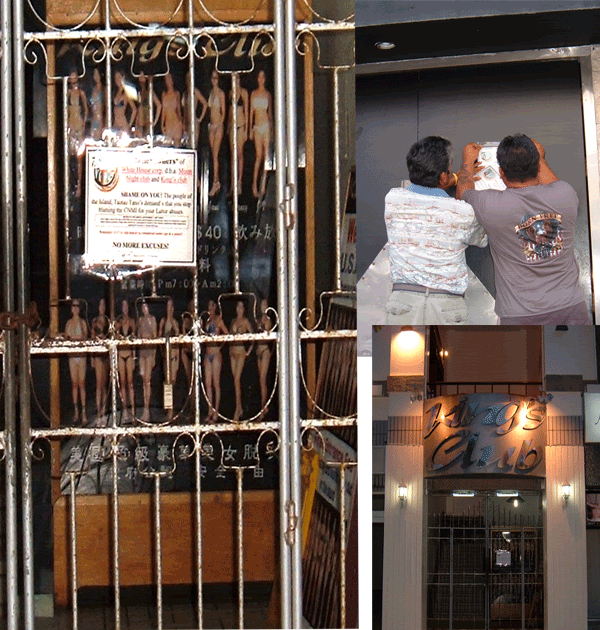
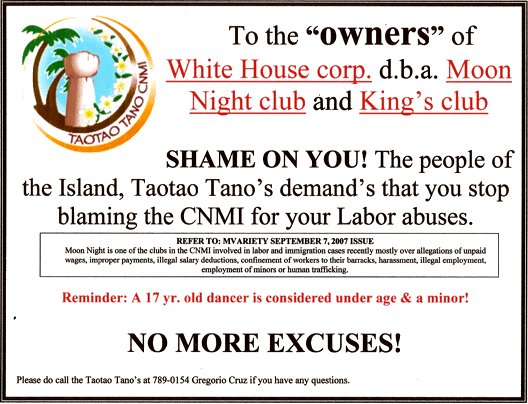
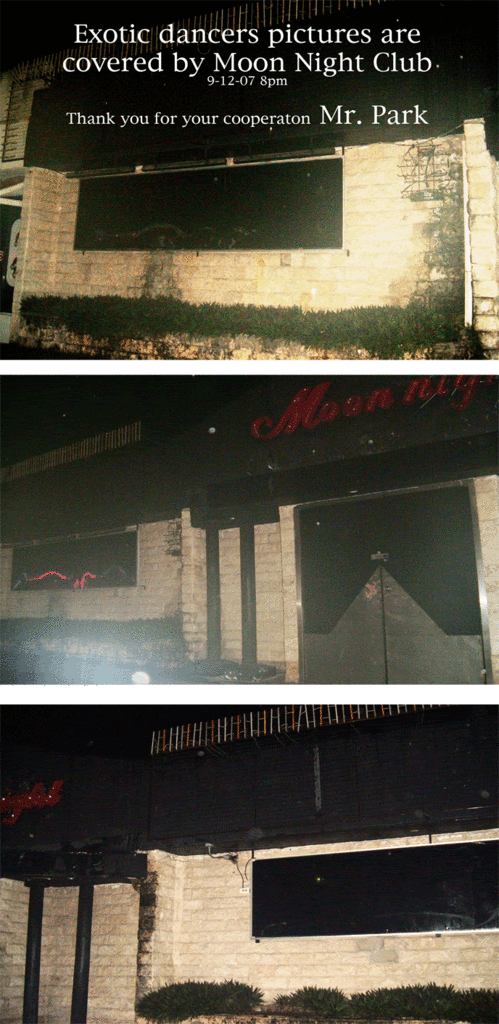
1 comment:
Jim should just pack up and leave if he can't stop the whinning. Our government is trying as much to protect our island and Jim is one of the crybaby that goes around here complaining about this bill. Please stop critisizing our lawmakers and stop the whining sir. America is not perfect with it's own law. With it's own 11 million illegal immigrants, you, stayman & Cohen should be ashame of yourself. Why fix it when it's not broken,Sir? Shame on you, Jim!!!!
Post a Comment